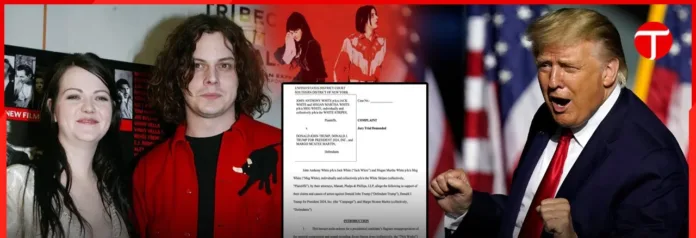The White Stripes frontman accuses Trump of “flagrant misappropriation” of the band’s iconic song, with support from fellow musicians.
Jack White has officially taken legal action against Donald Trump, accusing the former U.S. president of using The White Stripes’ anthem “Seven Nation Army” without permission. The lawsuit, filed in the United States District Court for the Southern District of New York, alleges “flagrant misappropriation” of the song.
The dispute began when Trump’s Deputy Director of Communications, Margo Martin, posted a video on X (formerly Twitter) on August 29, 2024. The video featured Trump boarding a plane, with “Seven Nation Army” playing in the background. White, known for his outspoken political views and his band’s distinctive sound, reacted strongly to the unauthorized use of the track.
In a provocative Instagram post, White shared the opening page of the lawsuit, accompanied by the caption, “This machine uses fascists,” a nod to folk legend Woody Guthrie’s famous slogan. White’s post emphasized his displeasure with Trump’s use of the song and hinted at ongoing legal challenges faced by the former president, stating, “Lawsuit coming from my lawyers about this (to add to your 5 thousand others).”
The lawsuit names both Trump and Margo Martin as defendants. It accuses the Trump campaign of failing to seek or obtain permission from The White Stripes before using the song and of ignoring pre-litigation attempts to address the issue. The suit demands legal redress for the unauthorized use and seeks to hold both Trump and his campaign accountable.
White’s legal action has garnered significant support from other musicians. Garbage, The Flaming Lips’ Wayne Coyne, Cat Power, Joe Satriani, and Jason Isbell have publicly expressed their backing. Garbage’s comment on White’s Instagram post read, “My hero,” while Cat Power’s comment was simply, “I LOVE YOU SO MUCH.” This solidarity underscores the broader support within the music community for artists defending their intellectual property rights.
White’s stance reflects a broader trend where artists are increasingly vocal about the misuse of their work, particularly in politically charged contexts. The case highlights ongoing tensions between public figures and artists regarding the use of creative content without proper authorization.
Analysis:
Political:
Jack White’s lawsuit against Donald Trump underscores the intersection of politics and intellectual property rights. By targeting Trump, White positions himself in opposition to the former president’s political activities, using legal channels to challenge what he views as an infringement on his artistic rights. This action reflects the broader political discourse where cultural figures engage with political figures to address grievances and assert their rights.
Social:
The lawsuit reflects growing social awareness about the rights of artists and the ethical implications of using their work without permission. White’s strong reaction and the support from other musicians indicate a cultural shift towards greater respect for intellectual property and a broader critique of how public figures use artistic content. The support from the music community highlights solidarity among artists in protecting their creative outputs.
Racial:
While the lawsuit itself does not directly address racial issues, it fits into a broader conversation about representation and respect in the arts. The actions of Trump and White touch on themes of cultural appropriation and the ethical use of creative works, which can intersect with discussions about representation and power dynamics in the arts.
Gender:
Gender dynamics are not directly addressed in this particular lawsuit, but the broader context of White’s actions and the support from female musicians highlight the role of gender in public reactions to intellectual property disputes. Women artists’ support for White underscores a shared commitment to upholding artistic integrity and resisting unauthorized use of creative works.
Economic:
The economic implications of this lawsuit are significant for both parties involved. For White and The White Stripes, the case represents a defence of their financial and creative interests, ensuring that their work is not exploited without due compensation. For Trump, the lawsuit adds to the array of legal challenges faced by his campaign, potentially impacting public perception and financial resources. The case exemplifies how intellectual property disputes can have substantial economic ramifications for both creators and users of copyrighted content.
